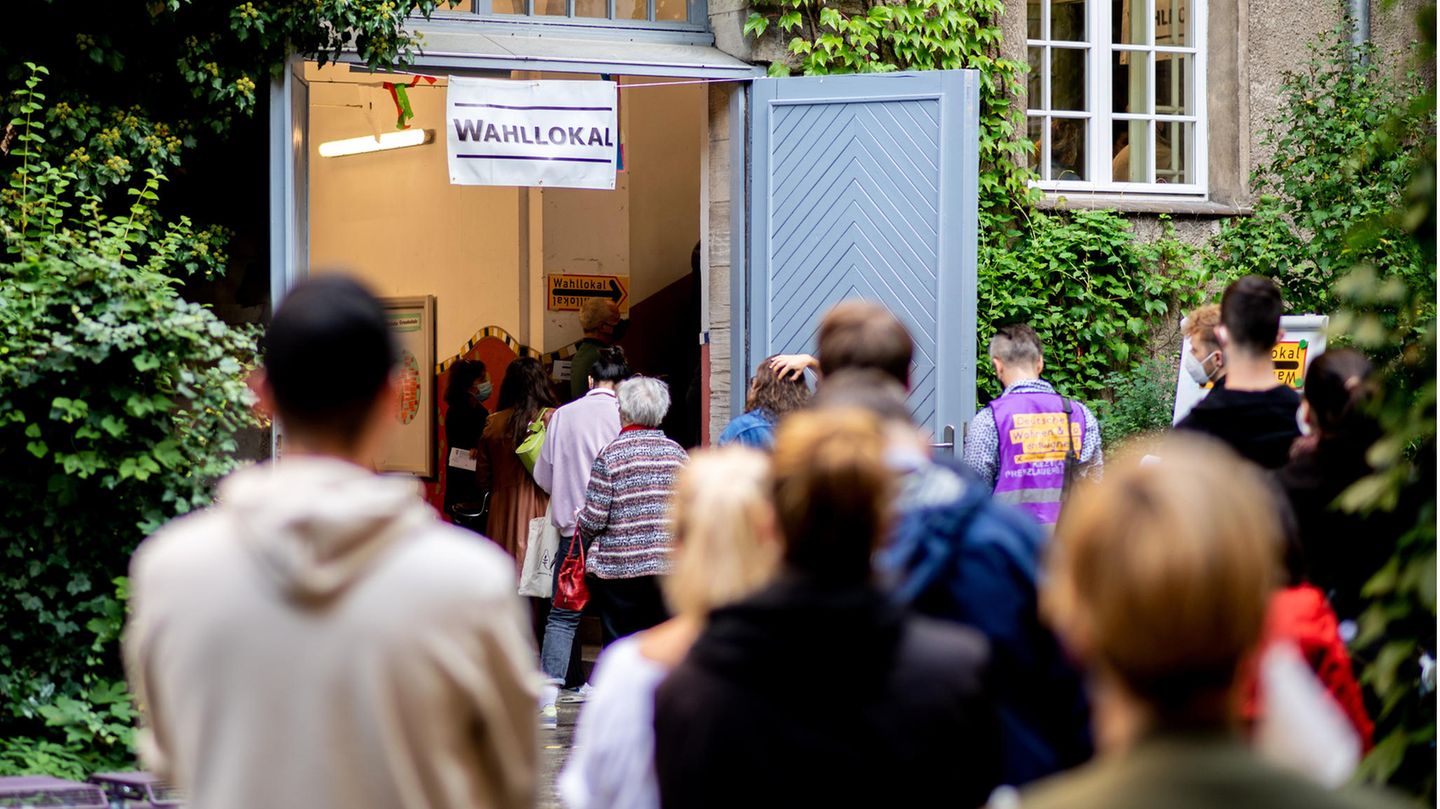In Berlin, the elections must be repeated. But it is unclear when and how. The Federal Constitutional Court in Karlsruhe must decide on this. Questions and answers on the complicated state of affairs.
Queues, missing ballot papers, polling stations open after 6 p.m.: Due to the many breakdowns on the great election day of September 26, 2021, Berlin is likely to have two repeat elections, for the Bundestag and the House of Representatives. But nothing is certain yet, because both decisions are a case for the Federal Constitutional Court. Time is short, but the matter is complicated – because different rules apply to the electoral examination. The most important thing in a double pack:
Will the elections to the House of Representatives be repeated completely as planned?
Starting position: On November 16, the Berlin Constitutional Court declared the election as a whole invalid. It must be repeated in full within 90 days. According to the judges, this is the only option – the electoral errors were too numerous and serious. At least 20,000 to 30,000 votes are affected. The repeat election is scheduled to take place on February 12, and preparations have long been underway. The twelve district assemblies are also to be elected a second time.
Complain: There was no regular appeal against this decision. In principle, however, a constitutional complaint can be lodged in Karlsruhe against any final court decision. Five such constitutional complaints are pending before the Federal Constitutional Court, four of which involve urgent applications. The most well-known is the first and largest case involving 43 plaintiffs, including affected MPs and members of the district parliaments.
Procedure: In the case of constitutional lawsuits, Karlsruhe is not an extra authority that checks everything again. The only question is whether the Basic Law has been violated. The plaintiffs believe that this happened: the Berlin judges arbitrarily ignored the Karlsruhe principles of election testing and created their own regulations. They were obliged to appeal to the Federal Constitutional Court before a judgment was passed.
Process: The court does not announce interim results while the proceedings are ongoing and usually does not commit itself to a time. On request, however, it is said that in view of the approaching election date, one sees “particular urgency”. Before the turn of the year, those affected were given the opportunity to comment on the urgent application by the large group of plaintiffs, with a deadline of January 10th.
Scenarios: With the urgent application, the plaintiffs want the election to be postponed until Karlsruhe has made a final decision. It is difficult to imagine that the judges will not act on this in time before February 12th. Because otherwise an election would be held, of which no one knows whether it is legitimate. There are always cases in which a decision is taken on a constitutional complaint and an urgent application at the same time. One challenge is that two judge positions have just been filled in the responsible second senate – the new ones have to get used to the job first.
To what extent will the Bundestag elections be repeated in Berlin?
Starting position: The Bundestag is responsible for the scrutiny of elections. More than 2000 objections were received there. The majority of these, a good 1,700 objections, were decided on November 10th. According to the recommendation passed by the election examination committee, the election in Berlin should only be partially repeated – in those places where incidents have been proven. This affects 327 of the 2,256 constituencies and 104 of the 1,507 postal voting districts. The traffic light factions SPD, Greens and FDP voted for this solution.
Discomfort: Unlike the House of Representatives, the Federal Constitutional Court is the formal complaints body for the election review at federal level. Eligible voters whose objection has been rejected by the Bundestag, individual members of parliament or parliamentary groups can lodge a complaint. There was two months to do this, in most cases until January 10th. So far, 19 complaints have been received in Karlsruhe, including one from the AfD and one from the CDU/CSU parliamentary group. The AfD wants the federal elections to be completely repeated in the capital. The Union believes that around 1,200 constituencies would have to be re-elected.
Procedure: The court examines whether the electoral law is compatible with the Basic Law and whether it has been correctly applied. The decision may only go as far as the identified electoral error requires. This is required by the grandfathering of an elected parliament. The basic rule is that only those electoral errors that affect the distribution of seats in the Bundestag can lead to the election being invalid. Experts speak of mandate relevance.
Process: Here, too, the time is breathing down the necks of the judges. There are no deadlines. But the election period is progressing and will be half over by the fall. It could be that the Senate schedules an oral hearing – this makes the procedure more transparent for the citizens, but also delays the decision. According to the Federal Constitutional Court Act, complaints about election scrutiny can be waived if “no further advancement of the procedure is to be expected” from the hearing.
Scenarios: As part of the Bundestag resolution, a comprehensive decision is made on the validity of the election and any election errors. So the outcome is completely open. So it could not only happen that the judges order the repetition in more or all Berlin electoral districts. It would also be conceivable that the Senate would come to a less far-reaching solution than the Bundestag. If the Berlin federal election is partially or completely declared invalid, the repeat election must take place after 60 days at the latest.
Source: Stern
David William is a talented author who has made a name for himself in the world of writing. He is a professional author who writes on a wide range of topics, from general interest to opinion news. David is currently working as a writer at 24 hours worlds where he brings his unique perspective and in-depth research to his articles, making them both informative and engaging.




